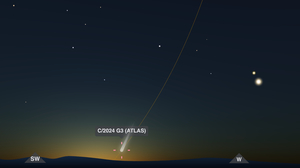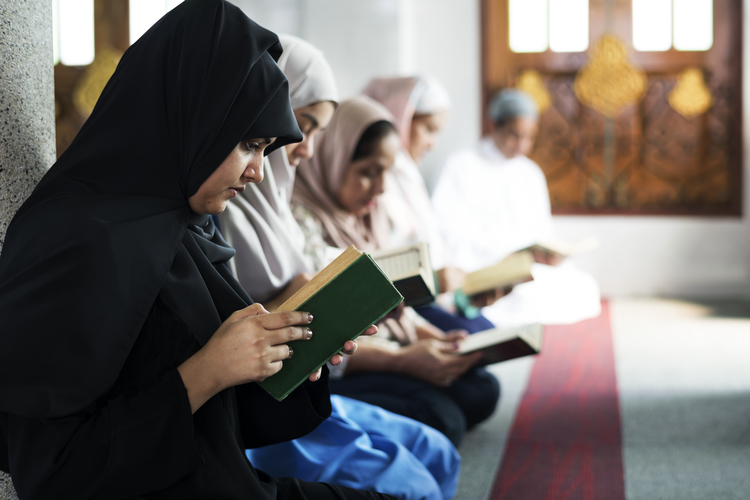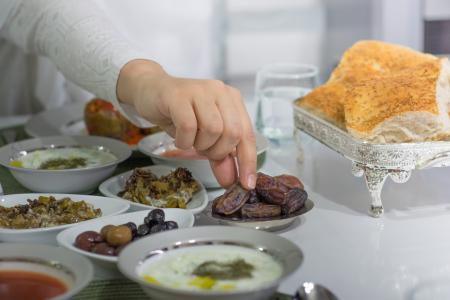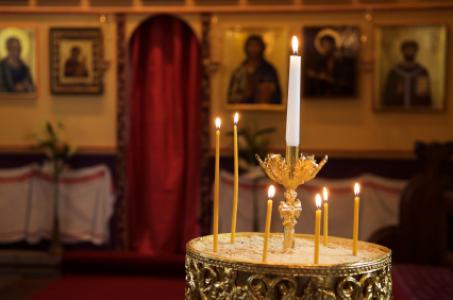
Best Comet of 2025?
C/2024 G3 (ATLAS) has already become very faintly visible to the naked eye for observers in the Southern Hemisphere.
On Laylatul Qadr, Muslims in the United Kingdom commemorate the night when Allah revealed the Quran, or Koran, to the prophet Muhammad. It is considered the holiest day of the year.

Laylatul Qadr is a day of prayer and good deeds.
©iStockphoto.com/Rawpixel
Laylatul Qadr falls on the 27th day of Ramadan, the ninth month of the Islamic calendar. It is the highlight of the Ramadan period.
Muslims use a lunar calendar which differs in length from the Gregorian calendar used worldwide. This means the Gregorian date of Muslim holidays shifts slightly from one year to the next, falling about 11 days earlier each year.
There is a difference of opinion over the exact date of Laylat al-Qadr, but there is a general consensus it should take place in the last 10 days of Ramadan, with odd-numbered days being more likely. Most Muslims celebrate Laylatul Qadr on the 27th of Ramadan, but some Muslim communities may do so on a different date.
The timing of Muslim months and holidays generally depends on the sighting of the Moon's crescent following New Moon. Because the Moon's visibility depends on clear skies and several other factors, we cannot predict the exact date of Muslim holidays with certainty.
Also, since the Moon is never visible in all world regions at once and current local dates can vary from one country to another, a holiday may fall on different dates according to a country's longitude and time zone. So, some Muslims may celebrate a holiday one day earlier than others, depending on their country or region of origin.
While Laylatul Qadr carries great significance for Muslims, there are no bank holidays associated with this particular date in the United Kingdom. However, since the Gregorian date of Muslim holidays changes every year, Laylatul Qadr can fall on other UK bank holidays.
Islamic businesses and organizations may change opening hours to suit prayer times during Ramadan. There may also be some congestion around mosques, such as the London Central Mosque in Regent’s Park, especially in the evenings.
Laylatul Qadr can also be written Laylat al-Qadr or Lailatul Qadr. Other names include Shab-e-Qadr, Night of Power, Night of Decree, Night of Value, Night of Measures, and Night of Destiny.
According to the Islamic faith, Laylatul Qadr is the holiest day of the year. On the evening preceding the date, Muslims all across the UK flock to their local mosques to pray. It is believed that worshipping Allah on Laylatul Qadr is more rewarding than doing so for 1000 months. Some Muslims spend the whole night praying or reciting the Quran.
Forgiveness and atonement are central themes of this day. In a practice called Ehyaa, many Muslims in the UK congregate during the night of Laylatul Qadr to pray to God for mercy, forgiveness, and salvation. Some Muslim communities organize talks and discussions on these topics. These meetings may also include members of other faiths.
Another central feature of Laylatul Qadr is Zakat, the practice of giving to charity or contributing to the community in some way. While Muslims consider the whole month of Ramadan a period of charity, a good deed on Laylatul Qadr is believed to be particularly rewarding.
It is common for mosques or Muslim organizations in the UK to raise money for worthy causes. For example, in 2017, the Green Lane Mosque and Community Centre in Birmingham organized a fund-raiser for children affected by the civil war in Syria. Other causes that year included supporting the victims of the Islamist terror attack in Manchester and of the Grenfell Tower fire in London.
Muslims believe that Laylatul Qadr marks the day in 610 CE when the first verses of the Quran were revealed to the Islamic prophet Muhammed. The Quran is the central religious text of Islam.
Read more about the background of Laylatul Qadr
With nearly 2.8 million Muslims living in the United Kingdom, which equals about 4.8% of the population, Islam constitutes the second largest religion in the country, after Christianity. The largest Muslim community can be found in London. The municipalities of Bradford, Luton, Blackburn, Birmingham, and Dewsbury also have significant Muslim populations.
Note: Regional customs or Moon sightings may cause a variation of the date for Islamic holidays, which begin at sundown the day before the date specified for the holiday. The Islamic calendar is lunar and the days begin at sunset, so there may be one-day error depending on when the Crescent Moon is first seen.
| Year | Weekday | Date | Name | Holiday Type |
|---|---|---|---|---|
| 2020 | 火曜日 | 5月19日 (火) | Laylatul Qadr (Night of Power) | Muslim |
| 2021 | 土曜日 | 5月8日 (土) | Laylatul Qadr (Night of Power) | Muslim |
| 2022 | 木曜日 | 4月28日 (木) | Laylatul Qadr (Night of Power) | Muslim |
| 2023 | 月曜日 | 4月17日 (月) | Laylatul Qadr (Night of Power) | Muslim |
| 2024 | 金曜日 | 4月5日 (金) | Laylatul Qadr (Night of Power) | Muslim |
| 2025 | 水曜日 | 3月26日 (水) | Laylatul Qadr (Night of Power) | Muslim |
| 2026 | 日曜日 | 3月15日 (日) | Laylatul Qadr (Night of Power) | Muslim |
| 2027 | 金曜日 | 3月5日 (金) | Laylatul Qadr (Night of Power) | Muslim |
| 2028 | 火曜日 | 2月22日 (火) | Laylatul Qadr (Night of Power) | Muslim |
| 2029 | 土曜日 | 2月10日 (土) | Laylatul Qadr (Night of Power) | Muslim |
| 2030 | 木曜日 | 1月31日 (木) | Laylatul Qadr (Night of Power) | Muslim |
While we diligently research and update our holiday dates, some of the information in the table above may be preliminary. If you find an error, please let us know.

C/2024 G3 (ATLAS) has already become very faintly visible to the naked eye for observers in the Southern Hemisphere.

Muslims in the United Kingdom welcome Ramadan as a period of fasting, self-evaluation, and spiritual growth.

Orthodox Christians in the United Kingdom mark the start of a new calendar year on either January 1 or 14 in the Gregorian calendar.

Burns Night celebrates the life and work of Robert Burns and Scottish culture in general. It is on or around January 25 each year.